2016 Triumph Thruxton R First Ride Review

Highlights
Café racers have become quite the craze in recent years, among the custom community as well as some motorcycle manufacturers. The original idea of café racers though was to make handmade, stripped down versions of production bikes and make them lightweight, agile and optimised for speed and handling for quick rides around town.
And like the legacy of the Triumph Bonneville name, the first café racers also made their appearance on the streets of Europe in the 1960s. It was a look that was made popular by riders who stripped down their bikes, not to engage in competition races, but to primarily zip between one popular café hangout to another around town, and the term café racer stuck.
The Triumph Thruxton however, has its name rooted in motorcycle racing history and named after the Thruxton 500 event; the inaugural edition in 1958 claimed by the legendary Mike Hailwood on a Triumph. The year later, a small batch of "Thruxton specification" Bonneville T120 models were produced for racing by the Triumph factory. By 1965, Triumph started a limited production run of Thruxton Bonnevilles, dominating the Thruxton 500 event for the next five years. In 1967, a Thruxton Bonneville even won the Isle of Man Production TT, piloted by John Hartle.
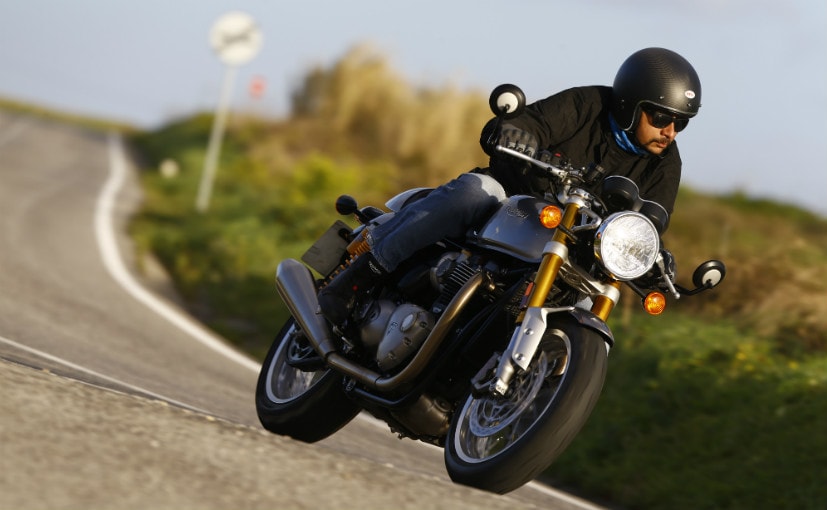
2016 Triumph Thruxton R Retro Style
Is it all new?
History lessons apart, I'll be honest - there was no expectation whatsoever from the latest generation Triumph Thruxton R. The outgoing model - itself a modern classic - certainly looked the part of the original café racer, but lacked the juice or the handling to really make any lasting impression or even be called a real homage to its racing heritage in this day of sporty street bikes.
When Triumph decided to pack in ride schedules of two new bikes of the Bonneville family in just one day in Portugal, it seemed to make sense; after all both bikes are powered by the same engine, the new 1200cc liquid-cooled parallel twin. For a moment, it seemed the differences between the two bikes are only cosmetic. But little did I know that I was setting myself up for assumptions, soon to be proven wrong, when we were handed over the keys to the Thruxton R after the mid-afternoon technical presentation.
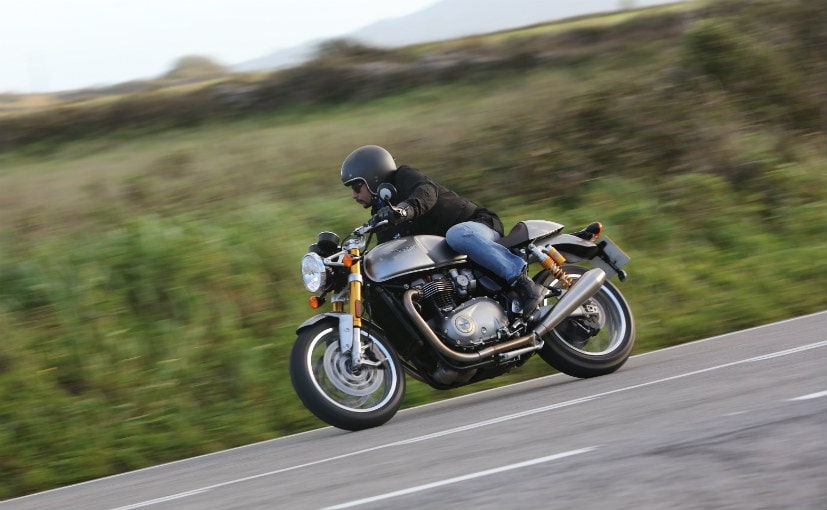
2016 Triumph Thruxton R Dynamics
One look and the Thruxton R looks the part - that of a striking and imposing silhouette of the iconic Thruxton racer. In a way, the Thruxton seems heavily inspired by modern day custom café racers. It almost looks like a factory custom job, in production form. And that's the beauty of it - it looks genuine and the quality of finish is top notch - from the polished top yoke to the sleek and narrow tank, topped by the brushed strap and Monza filler cap.
Equipment is high quality - be it the all-new headlight design with DRL, LED taillight, 3D dual clocks on the instrument panel and a host of rider focussed technology - switchable ABS, switchable traction control, torque assist clutch, ride-by-wire with three different riding modes - rain, road and sport - and liquid cooling.
The engine, the same unit as the one on the Bonneville T120 (Read our Bonneville T120 Review), is called the High Power version, as against the High Torque engine of the T120. The displacement is bumped up too - up from 865cc in the outgoing model to a 1200cc liquid-cooled parallel twin.
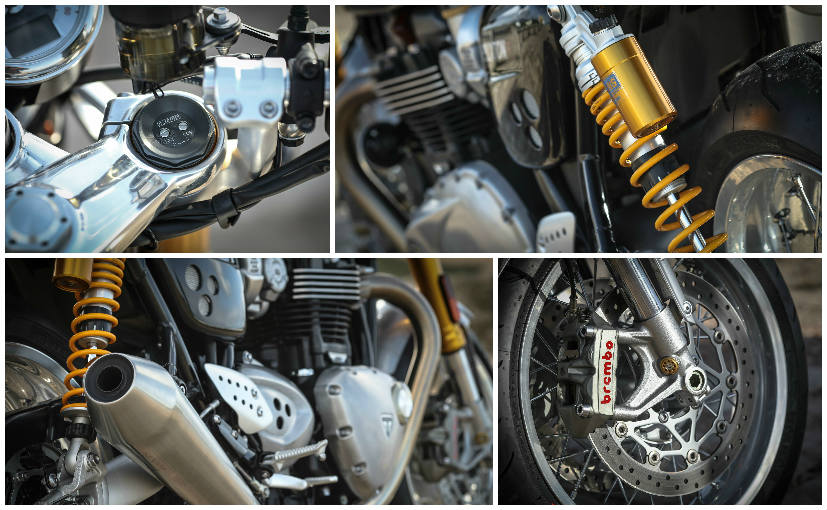
2016 Triumph Thruxton R Mechanicals
How different is the engine?
Structurally, the Thruxton R's engine gets a "low inertia" crank, that is the main difference between the same 1200cc mill on the Bonneville T120. What it does, in plainspeak, is let the same 1200cc motor rev more freely, so you can easily reach redline while accelerating through the gears.
Peak power is a healthy 96bhp at 6750rpm, not an eye popping number but the torque, a very meaty 112Nm of it, kicks in at 4950rpm. So, the moment you cross 5000rpm a surge of power and torque hits you and one look at the tacho, you realize you are hitting over 7,000rpm during shifts.
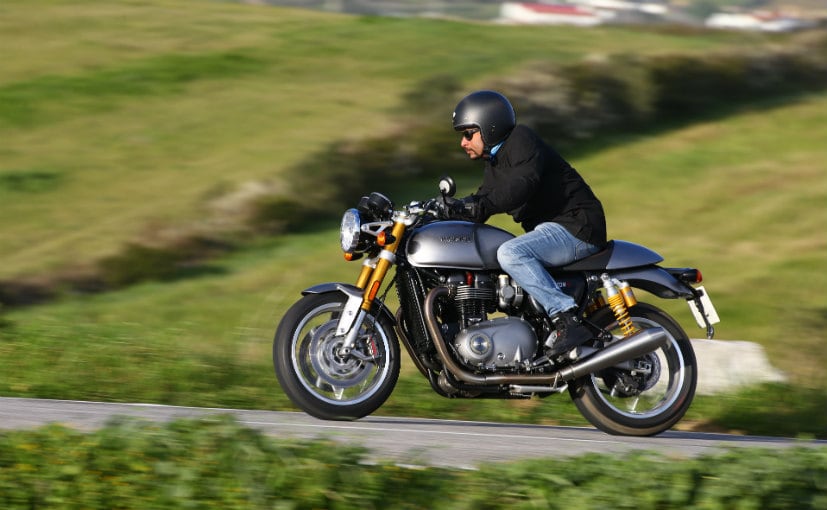
The new electronics play a pivotal role on the 2016 Triumph Thruxton R
Together with the high compression head, the larger airbox, increased rev limit and the high flow exhaust system (which by the way makes a very addictive rumble from the twin megaphone exhausts), the Thruxton R makes its presence felt as an altogether different animal. In fact, it would be difficult to tell it's the same engine as the Bonneville T120's, such is the character and personality of this engine.
Then, there's the traction control and ride-by-wire, with three modes - Rain, Road and Sport. Power output is same in all the modes, but throttle response is dialed down low on Rain and progressively increases from Road to Sport. Needless to say, Sport is where the hooliganism begins, the power and torque smacking you with entertaining ferocity, every time you redline through the six-speed gearbox. The wheelbase is shorter, so there's always an easy tendency for the front wheel to lift, if you are so inclined.
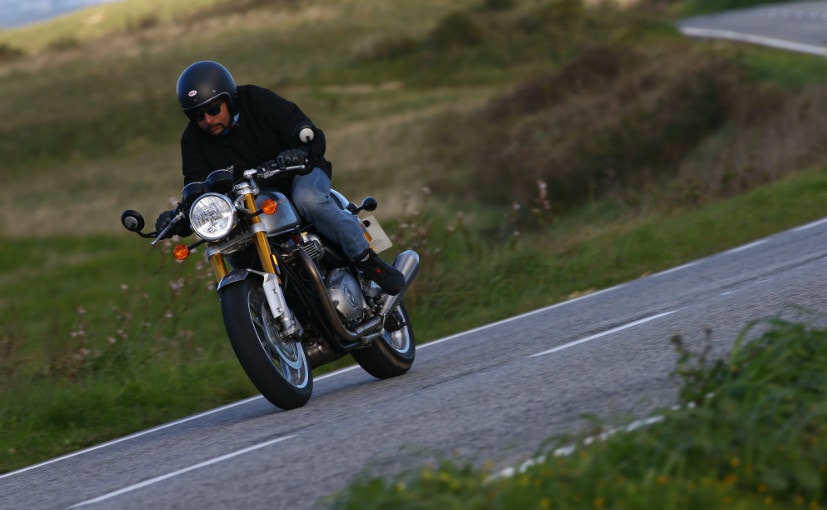
2016 Triumph Thruxton R Ride Quality
How does it ride?
The party piece of the Thruxton however, is not just the engine but the way the bike takes on the twisty bits we rode along the hilly roads towards Gradil from Cascais. The riding position is aggressive, but not too difficult to take on relatively long-ish sprints. The headstock is steeper and the rake is reduced for a shorter trail. The wheelbase has been reduced too, to 1415mm. What all this does is, makes the Thruxton R a sharp handler, for quick directional changes - so you can just point and shoot, if you will.
At 203kg dry weight, the Thruxton R isn't what you'd call a lightweight café racer. But the ease it which you can turn the bike, flip it around a set of corners, it doesn't make its weight felt, at all. The front end is super stable, intuitive and gives you a level of confidence which was beyond my level of skills. Undeniably, the Thruxton R will shine even more in the hands and er, 'legs' of a more skilled rider.
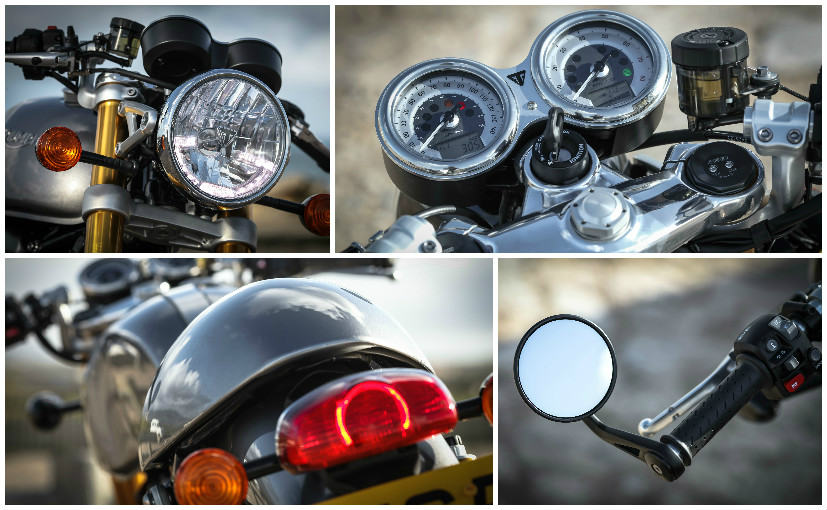
Attention to detail makes the Thruxton R stand out
The R spec variant we are riding, and the one that will be launched in India, gets higher spec suspension, brakes and tyres. The front suspension is taken care of by upside down big-piston Showa forks with twin Ohlins shocks at the rear, both fully adjustable. Overall the suspension is firm and sporty, and on the surfaces we rode on, the overall ride quality didn't feel like it will give you any reason to complain, even over minor road undulations.
The Thruxton R also gets radial monobloc Brembo callipers on twin floating discs. Just a dab on the front lever is enough to shave off serious speeds and the rear disc also offers progressive braking. The lightweight aluminium wheels are shod with Pirelli Diablo Rosso Corsas - designed specifically for the Thruxton R. And they offer confident grip, whether through tight corners or hard braking.
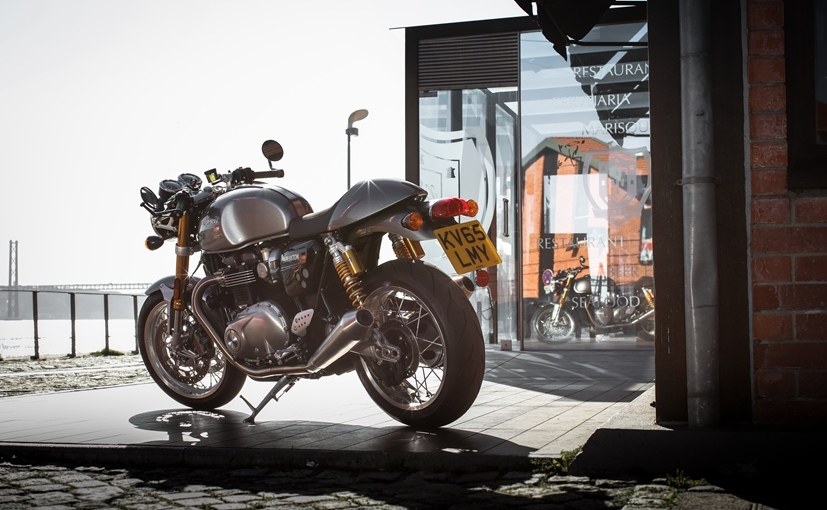
The twin exhausts make for an addictive note on the Thruxton R
Worth a buy?
The Triumph Thruxton R will soon be launched in India, and our guess is, it will retail somewhere around Rs 10-11 lakh (ex-showroom, Delhi). At that price, you are in litre-class sportbike territory with more power and more agility, if you're looking for a sporty ride.
That doesn't mean the Thruxton R doesn't offer you any sporty character. In fact, for me, the Thruxton R has crossed over from the Triumph classic range and can respectably rub shoulders with the likes of the Street Triple and the Speed Triple on any given track day. There's adequate power and entertaining torque, all within a very usable rev range to make this a hoot of a bike.
It looks great, sounds great and it's so much fun to ride, practicality and trackside bragging rights about power output figures may well take a back seat. Only question is - are you willing to let the fun factor take its course and go for the Thruxton R? Difficult question, but I'd wager there would be enough enthusiasts out there who are certainly going to be taken in by the Thruxton R's looks alone. One test ride later, they could well fall for it - hook, line and sinker.
(Photography: Alessio Barbanti, Matteo Cavadini, Paul Barshon and Freddie Kim)
Last Updated on March 15, 2016
Latest Reviews
- Home
- Reviews
- Bike Reviews
- 2016 Triumph Thruxton R First Ride Review














